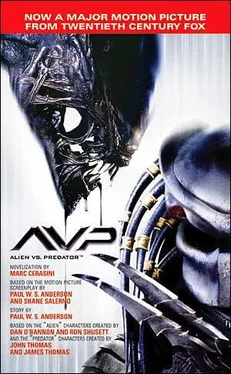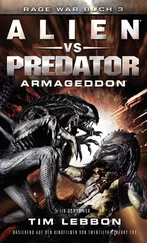“Just doing my job.”
Disgusted by his reflection, Weyland pushed the mirror aside. “I didn’t think it would happen this fast….”
Max crossed the room and rested his massive hand on Weyland’s shoulder. The man’s touch was surprisingly gentle. “You exerting yourself like this only accelerates the cancer….” He hesitated, reluctant to bring up the same arguments, though he felt he must. “Perhaps you should reconsider accompanying us. You could stay here. Monitor our progress on the radio—”
With the wariness of a trapped animal, Weyland eyed the hospital bed, the oxygen tanks, the medicines, and he shook his head.
“I’m dying, Max. And I’ll be damned if I do it here.”
Sebastian De Rosa followed the executive officer’s directions and located his cabin. He unlocked the door and stepped inside, delighted to discover that his quarters more resembled a stateroom on a luxury liner than a cabin on an icebreaker. For a moment Sebastian wondered if he’d been handed the wrong key, until he noticed that his luggage—what there was of it—had been deposited in the center of the room.
Sebastian opened his battered suitcase and removed an armful of clothes. When he opened the closet door, he was surprised to find clothing already hanging there—casual wear that fit his rather unexacting taste, along with cold-weather gear and even some equipment. He found waterproof pants and jackets, woolen sweaters and socks, thermal underwear, ski-style gloves, boots, woolen hats, and several bright-yellow Polartec pullovers stamped with the ubiquitous Weyland logo. A quick inspection revealed that everything was sized to fit.
“Mr. Charles Weyland, where have you been all my life?” he chuckled.
Sebastian was still feeling the high he’d gotten from Charles Weyland’s briefing. At last he had a chance to prove to the archaeological community that the history of the world as currently written by scholars and academics was nothing more than a string of assumptions, conjectures, half-truths and outright lies. The discovery of a temple complex in Antarctica shattered every preconception of modern archaeology, which was why so-called objective scientists resisted the truth—even when confronted by evidence. This was a phenomenon Sebastian had experienced firsthand, early in his career.
While still a graduate student, Sebastian had gained access to the Library of Congress collection of portolans—maps used by fourteenth- and fifteenth-century seamen to travel from port to port. One of the maps he’d examined had been created in 1531 by Oronteus Finaeus. It displayed an accurate depiction of the entire continent of Antarctica as modern science now allowed it to be seen from outer space. Every bay, every inlet, every river, every mountain—all of the land hidden under tons of ice had been accurately reproduced on the Finaeus Portolan almost five hundred years before.
But how? Sebastian had wondered.
He’d learned from cartographers that most portolans used in the Age of Exploration had actually been copies of far older maps created by the ancient Romans and Egyptians. But even when the Egyptians had flourished, as far back as four thousand years, the South Pole had been completely covered by pack ice up to three thousand feet thick. Even if the Egyptians had sailed to Antarctica—which was absurd, because they hadn’t had a navy until Cheops’s father created one in 2000 B.C.—the ancient sailors would have found nothing but ice. It wasn’t until the latter half of the twentieth century that modern scientists discovered the actual topography of the hidden continent under the ice, and they had used deep-sounding sonar techniques to do it.
So who had mapped the territorial features of Antarctica in ancient times, and how?
Sebastian had concluded that only two theories were possible. The first was put forth in 1967 by Erich Von Daniken in his book Chariots of the Gods? Von Daniken concluded that space aliens had visited earth thousands of years ago and had helped primitive man create maps, build the pyramids, formulate calendars and construct ritual sites, where humans and aliens had interacted.
Sebastian’s theory was far less outrageous. He believed that the original map Finaeus copied had probably been made at a time when Antarctica had been warm and habitable, and home to a now-forgotten civilization. The existence of the Finaeus Portolan, along with the Piri Re’s map discovered in Istanbul, were solid evidence that Sebastian’s theory was correct.
Yet when he’d presented his findings to his fellow archaeologists, his work had been rejected out of hand, despite the fact that physical evidence to prove his conjectures existed at the Library of Congress for anyone to examine.
After this sobering incident, Sebastian had been forced to conclude that either his fellow archaeologists hadn’t bothered to read his paper, or they’d refused to face the truth. Either way, the pyramid complex Weyland had discovered in Antarctica—if indeed it was a pyramid complex—would slam the door on rigid, conventional thinkers in the academic crowd.
Just let them try to dismiss this!
As he shaved and dressed for dinner, Sebastian whistled tunelessly. He could not help but think that now, after years of controversy, scorn and neglect, all of his work would soon be vindicated, all of his theories proved.
* * *
Lex closed her eyes and felt the hot water wash over her. After two weeks in the wilderness, followed by a day of travel, the shower felt almost like a religious experience.
Searching the stall for a bar of soap, she found a packet of Savon de Marseille, an expensive handmade olive oil soap from the south of France. She sniffed, then frowned. Probably the same soap Charles Weyland offered to the fancy set at his Parisian hotel. She wasn’t surprised. Like the high-end clothes and expensive gear she’d found in her closet and these ridiculously opulent accommodations, everything Weyland had provided was top of the line. But Lex still didn’t like to be bought—a gilded cage was still a cage. And she much preferred a pitched tent 15,000 feet up Everest’s North Face.
On the other hand, she did need to get clean. Ripping open the packet and squeezing the soap into her hand, Lex considered her opinion of Weyland, now that she’d actually met him. All evidence so far pointed to one conclusion: another billionaire eccentric. And this expensive expedition: a singular waste of time, and a dangerous one that would probably get most—if not all—of them killed.
She’d seen Weyland’s type before—too rich, too bored, too full of themselves. Dilettantes who become temporarily fascinated by a subject, only to flit like a magpie to the next bright, shiny idea that flashed across CNN. Lex resented their ilk, not because she was jealous but because men like Weyland possessed money and power, and wasted both. They drifted through life without accomplishing anything beyond building a Godzilla-sized stock portfolio, while scientists and researchers who dedicated their entire careers and reputations to a cause were forced to bow and scrape for the crumbs they’d toss as an afterthought or a tax deduction.
As Lex rubbed the pricey soap into a thick lather and applied it to her taut body, she could almost hear the voice of Gabe Kaplan, the foundation’s fund-raising director, ringing in her head with all the charm of a never-ending Nike commercial: “C’mon, Lex, get with the program. Bowing and scraping costs us nothing and gains the foundation everything. Just do it.”
Lex accepted the money Weyland promised to help the Foundation of Environmental Scientists, but she refused to be a party to the expedition’s collective suicide.
At best, Lex figured Weyland and company would sail to Bouvetoya Island; Quinn and his cronies—walking environmental disasters to the last man—would poke a hole in the ice; and all those archaeologists talking about a pyramid would find a huge pile of quartz, or shaped ice, or volcanic fissures or one of a dozen other natural formations that somehow mimicked the appearance of a temple complex.
Читать дальше












